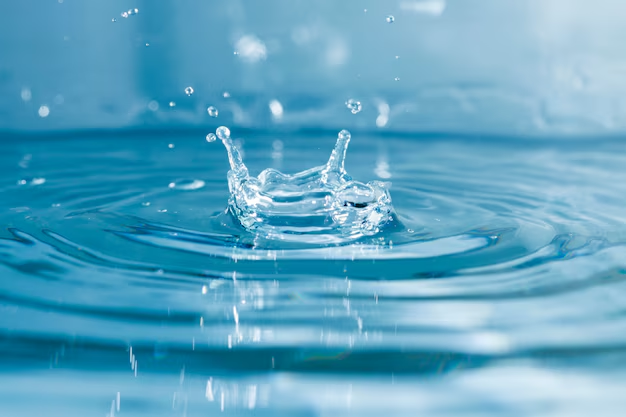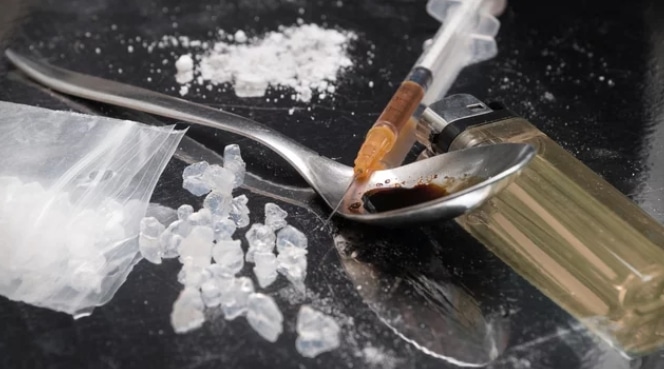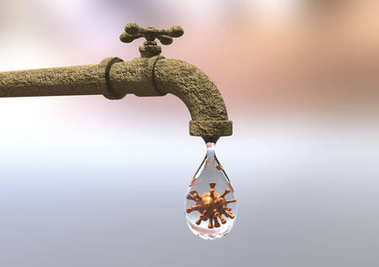Is hard water really that bad? With myths and misinformation, many people are unsure about the true effects of hard water. While it can be damaging in some ways, it can be beneficial in others. We explore the effects of hard water to see if it is that bad.What is hard water?
Before exploring the effects of hard water, let’s briefly cover what it is. Hard water is supplied to around 60% of homes in the UK. The Central and East of England experience the hardest water.
While the density of hard water is the same as soft water (meaning It’s not physically harder), hard water is characterised by the minerals present. Hard water contains magnesium and calcium minerals. The greater the mineral content, the greater the water hardness.
Through the weathering process, rainwater that falls over limestone rocks in some areas of the UK causes the rocks to dissolve. As the rocks dissolve, minerals are deposited into the water. This water then enters reservoirs and streams, which are the source of our water supply.
Is hard water damaging to our health?
One of the biggest misconceptions about hard water is whether it harms our health. Many people believe that drinking hard water can cause kidney stones due to the presence of calcium.
However, research has found a low risk or low correlation between the calcium and magnesium minerals in water and the cause of kidney or urinary stones. While it has a minimal impact, drinking water to stay hydrated can reduce the risk of developing stones.
Drinking the minerals in hard water can be beneficial to achieving our recommended calcium and magnesium intake. Magnesium is one of the minerals found in hard water that benefits our health.
Our bodies need magnesium to turn food into energy and to ensure the parathyroid glands work correctly. The parathyroid glands are essential for producing the parathyroid hormone that keeps our bones healthy. It also helps regulate calcium levels.
A healthy diet will need to consume 300mg a day for men and 270mg daily for women. While you can get magnesium from some foods, such as spinach and wholemeal bread, drinking hard water with magnesium contributes to our daily intake.
Calcium is another of the minerals found in hard water that benefits our health. Our bodies need calcium to keep bones and teeth healthy, regulate muscle contractions (including the heart), and ensure blood clots normally.
As with magnesium, you can get calcium from certain foods, such as dairy and leafy green vegetables. However, drinking hard water can also gain part of your recommended daily intake. Adults require 700mg of calcium daily for a balanced, healthy diet.
Even though hard water is healthy to drink, some people find the taste or smell funny. Some people find the taste of hard water metallic or the smell of rotten eggs due to bacteria reacting with magnesium to form sulphates.
The effects on skin and hair
One area where hard water can damage our health is its effect on skin and hair when we wash. That’s because the minerals in hard water are bad reactants with soap and shampoo. As a result, you need to use more soap to create a sufficient lather.
The bad reaction with soap also creates an insoluble layer on your skin and scalp that is difficult to wash off. This residue left on the skin and scalp creates problems in keeping the skin sufficiently healthy and moisturised.
The residue left on the skin blocks and clogs the pores, preventing the release of natural oils that moisturise our skin. Eventually, this can lead to the skin and scalp becoming dry, irritated, red, or irritable.
This is also the same for your hair. The minerals in hard water penetrate the hair strands, which crystalise as your hair dries. This creates a layer that blocks moisture. As a result, hair becomes dry and duller in appearance. It can also cause faded colouring and dandruff.
Porous hair is most susceptible to the effects of hard water. Leaving your hair in a glass of water is a good way to check. If the hair sinks after a few minutes, it is very porous. Hair that stays floating is not very porous.
People find washing their skin and hair using soft or descaled water softer and smoother. Those with skin or scalp conditions benefit most from soft or descaled water.
Eczema
Another issue attributed to hard water is the inflammation caused by eczema. With hard water drying out the skin, those with eczema are much more susceptible to gaps in the skin due to the damage to the skin barrier.
As a result, people with eczema in hard water areas are much more likely to experience skin inflammation, bleeding, cracking, flaking, and blistering – all conditions arising from eczema. Washing with soft water is recommended for those with eczema.
There is also evidence to suggest that the damage to the skin barrier resulting from hard water can also lead to the development of eczema. There is some correlation between the number of people with eczema and the hard water supply.
Younger children are at greater risk of developing atopic eczema in hard water areas than in soft water supply areas. This is made worse as no cure is available to treat eczema. Only preventative measures can reduce the problems.
What household problems does hard water cause?
Another issue associated with hard water is its effects on the home. Hard water forms scale deposits due to the mineral content. Pipes, surfaces, and appliances can suffer from scale deposits from hard water.
Hard water spots are one of the most common signs around the home. Glasses, dishes, and shower screens are most susceptible to showing hard water spots. As hard water evaporates, it leaves behind a stain or mineral deposits.
This can cause the dishes to look unclean, and bacteria can also spread and get stuck in the microbial film. This will require extra cleaning to remove the stain, usually requiring vinegar to remove stubborn stains effectively.
Hard water build-up can also occur inside your appliances. The kettle, washing machine, tumble dryer, heating systems, and other water appliances will be susceptible to scale build-up. Where water is heated, this is particularly a concern.
Over time, the scale build-up accumulates and gets thicker. Gradually, appliances and heating systems become less effective. As a result, appliances will struggle to operate efficiently, which causes them to break down much sooner.
Heating systems must also be turned up to feel the same effect as before, increasing utility bills. The damage caused to appliances is considered the most expensive effect of hard water.
Maintenance and replacement of appliances are needed much sooner and more frequently. The issues mentioned earlier with hard water and soap also extend to washing clothes. Clothes can wear out faster and appear dingy due to the bad mixture of hard water and detergent.
Scale deposits from hard water also cause blockages in copper pipes. Scale deposits build up around the pipe’s inside, which gets thicker over time. Not only does it restrict the flow of water, but it can lead to significant plumbing incidents (such as cracked pipes).

How can you remove the problems associated with hard water?
If you experience any of the hard water problems above, you may wish to find a solution to eliminate such issues. Fortunately, there are two solutions: a water descaler and a water softener.
Water descaler
A water descaler is a small electronic device attached to the main water supply. A small electrical field is passed through the pipe that affects the forms of calcium carbonate. This prevents the particles from forming solid deposits.
No chemicals are added to the water, and the chemical composition of the water remains unchanged. Hard water minerals stay in the water but do not cause the associated problems. Other water descaler benefits include ease of installation and low cost.
It also provides a much more cost-effective solution to overcoming hard water problems. While the water remains hard, the cost-saving benefits of installing a water descaler can be more beneficial for areas with slightly and moderately hard water levels.
Water softener
A water softener is another method for removing the problems associated with hard water. However, unlike a water descaler, it requires regular attention and replenishing of salt pallets for ionising.
A water softener does remove the minerals in hard water to make it soft. However, this can leave a salty taste in the water. The salt replenishing the water softener can also be expensive, costing between £8 and £25 per bag.
A large amount of water is also required during the regeneration process, resulting in waste afterward. Due to the high cost, a water softener is usually only suited to areas with very hard water supplies.
Hard water can be both beneficial and damaging. While it can contribute to our recommended daily mineral intake, damage to hair and skin can also be damaging. Scale build-up around the house can also be a significant and costly problem. A suitable hard water solution can address such issues.
Collins Nwokolo is a human physiologist, writer and health enthusiast. He loves writing helpful articles on health and fitness, which he enjoys sharing with everyone.









